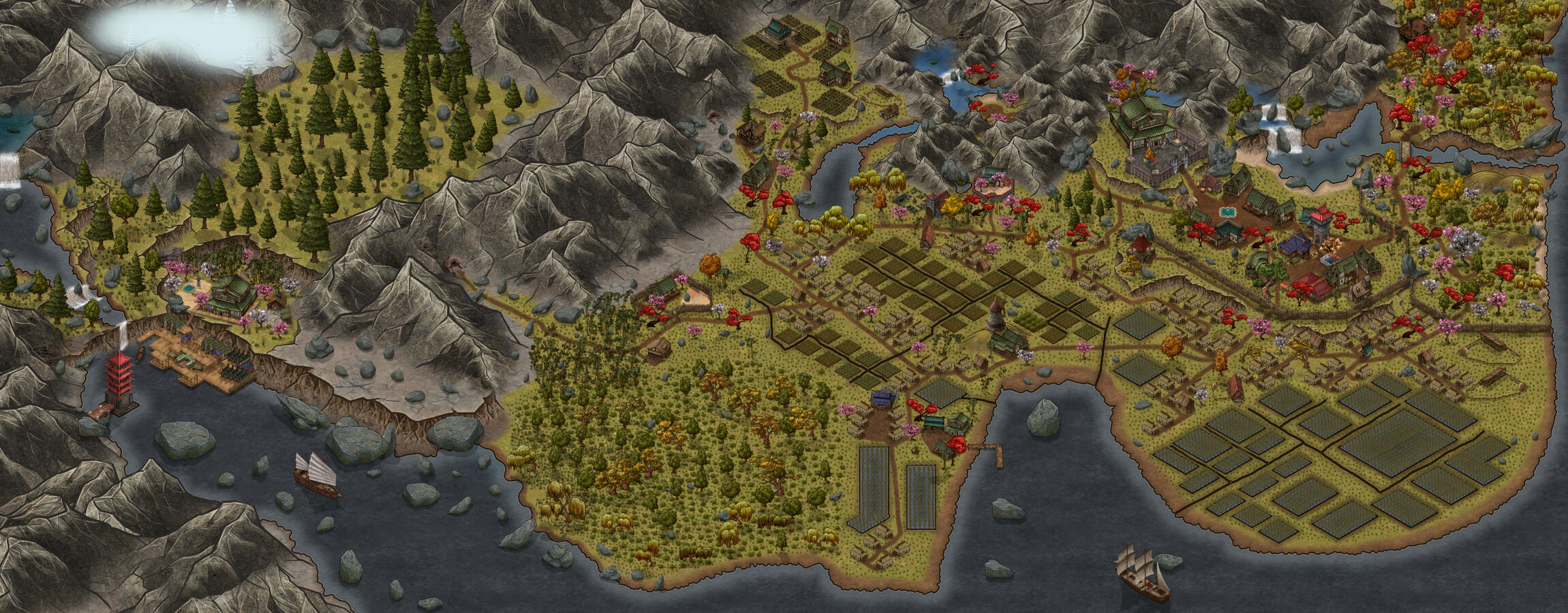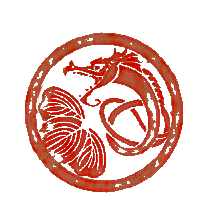


Prefectural Colony of Takkadei
"We are the people of Takkadei—carriers of the flame, keepers of the serpent’s wisdom, and settlers upon these highlands. And from this day forth, this place shall know us as kin to the soil beneath our feet. Our roots will grow deep. And when the winds of history rise again, they will find us unshaken."
The Exodius
2E 104: Thunder Guard Temple is abandoned by the Potentate. Many of the garrison resettled in the area of Aleswell north of the Imperial City.
2E 430: Assassination of Savirien-Chorak and all his heirs. The Potentate, and Second Empire, dissolves into numerous warring states. The village of Aleswell aligns with Bruma for security.
2E 440: Colovian warlord Attrebus seizes the Imperial City and the Ruby Throne. One of his first decrees is the Serpent Expulsion, banishing those of Akaviri descent from Cyrodiil; blaming them for the woes of the Empire.
2E 440: The future colonists of Akariue depart from Aleswell, joining several caravans as they move south into Elsweyr.
2E 441: Following invitation by the King of Rimmen and Anequina, Akaviri exiles are permitted to settle in the region known as The Rim. The settlers of Akariue detach and move into the fertile valley separating Anequina and the region of Blackwood, and north of the city of Alabaster who serves as a key trading partner.
2E 442: Following the ancestor of Magnate Kaisha-Chah, the village of Akariue (‘Dragon Home’) was founded in this year. During the Exodus, 300 of the 2000 refugees die of various causes.
The Initial Struggles
2E 446: Construction of Akariue is mostly complete. The village is primarily based around farming.
2E 448: The Ogre Subjugations take place. Following attacks on outlying farms, the Syffim of Akariue led by Deshekin-Zhak scour nearby Ogre tribes.
2E 449: The first Harpy Exterminations occur.
2E 450-2E 480: A ten year period of establishment and subjugation of the threats in the valley.
2E 481: A severe drought causes famine in Akariue.
Golden Age of Akariue
2E 503: As a result of consistent campaigns against local threats, Khajiit merchants from Alabaster recognize the valley as a useful trade route north to the city of Rimmen. This results in an influx of trade
into and through Akariue, who adapt to serve as a post station between the two city-states.
2E 507: As trade continued, Akariue revitalized many long unused skills such as lacquerware, smithing and silk making.
2E 515: Slavers attempt to establish a camp near Akariue. The Akariue Syffim, assisted by the Nightrunners of Alabaster, drove out the slavers. This was the last major conflict fought by Akariue for 61 years.
2E 522: A Khajiit-owned iron mine is opened in Akariue’s boundaries. An agreement is made where a portion of the resources and profits are given to Akariue as taxation. A small, permanent population of Khajiit is established.
2E 525: The Barter Act is ratified. Trade between Akariue villagers is to be conducted through bartering of goods and services rather than gold. This was to combat the growing power of local merchants.
2E 526 - 2E 560: Akariue becomes a prosperous settlement and its population expands. It becomes a beacon of Akaviri culture as old practices are revitalized. Tsaesci construction methods become prevalent as opposed to Cyrodillic.
Years of Woe
2E 560: Following the arrival of the Knahaten Flu into Elsweyr, Akariue closes its borders to all; no one is allowed to enter, no one allowed to leave.
2E 568: Akariue is once more opened, trade resumes.
2E 576: The Frostfall Coup occurs in Rimmen, and the region falls under the control of Euraxia Tharn. Trade between Alabaster, whose caravans pass through Akariue, slows as the Khajiit enact sanctions.
2E 576: A group of Khajiit bandits called the Sashaa-Krin attack Akariue, trying to use the village as a base for attacks against the new Tharn regime. The villagers successfully fend off the attack but take casualties; including Zhasu-Asi, First-Sword of Akariue and father of Revikus-Adi.
2E 578: The Soulburst occurs, and Akariue is not spared. 30 individuals found their souls torn from their bodies, and a force of Daedra and undead attacked the village, but were driven back at great cost.
2E 581: An emissary from the newly formed Aldmeri Dominion arrives to try and gain Akariue’s loyalty. He is respectfully rejected, and secretly assassinated in the Tenmar Forest by the Magnate’s Shadow as to not reveal their location to a potential threat. The death is attributed to dangerous beasts.
2E 587: Euraxia Tharn is overthrown, however due to Akariue rejecting the Aldmeri Dominion and as new routes opened, trade did not resume as it had before.
Resettlement to Colovia
2E 592: Following a letter from Revikus-Adi in a Dragonguard prison, Magnate Kaisha-Chah leads a force of 10 Akariue Syffim to aid in the slaying of the Dragon (forgot name). This action revitalizes the warrior spirit in Akariue.
2E 592: Following invitation, an assemblage of Akariue emissaries arrive in Spartharia. They spend this time searching for a site of a new colony they may resettle in. During this time, Thunder Guard Temple is rediscovered, and the valley surrounding serves as the site of the future village of Tsyokawa (‘Capital River’)
2E 592: Following the signing of an official treaty, the colony of Takkadei is formed. Of the 1467 inhabitants of Akariue, 657 made the initial move to Tsyokawa; more would arrive over time.
Society
To Be Written
Language
To Be Written
Social Structure
Within Takkadei there are five social positions that an individual may find themselves in. These positions are not generally hereditary, and individuals can shift to different ones over time. These positions are Merchants and Craftsmen, Laborers, the Bugyo, Onmyoji, and Syffim.
Merchants and Craftsmen
Individuals who do not work fields, but instead are semi-permanent travelers, artisans, and specialty service vendors. Merchants in Tsyokawa live either at their storefront or in small apartments with other merchants; craftsmen will typically have a room as part of their workshop or a nearby home.
Laborers
The majority of the population are the common laborers; the farmers, fishermen, loggers and miners. While not materially wealthy, they are the backbone of society in Takkadei. Since moving to the colony, peasants are now paid in gold for the resources they produce in an effort to combine the Spartharian economy with the colonies.
Ashigaru
The Ashigaru (‘light of foot’) are the class of part time militia of Takkadei. In times of peace, these individuals carry on with their daily lives; in times of war they may be called upon to participate. Most equipment of the Ashigaru is not as high quality as those of the Syffim, but are sufficient for the tasks assigned to them.
Bugyo
The Bugyo are those who have been trained in governance as magnates, councilors and magistrates. Of the population they are the least numerous and are respected for managing the colony.
Onmyoji
Onmyoji is the title given to master-mages of the elements: Air, Earth, Fire and Water. As these elements are tied to the Four Heavenly Courtiers, they are also commonly Courtiers of the faith; however their role is more in the magical nature rather than the spiritual. Onmyoji are often consulted for divination, healing, and thaumaturgy. Special titles for masters are as follows: Air-Seer, Earth-Judge, Fire-Sage, and Water-Diviner.
Syffim
The Syffim (‘Soldiers’) are the professionally trained warriors of Takkadei. The categorization of Syffim is relatively broad; from wealthy individuals trained in the martial arts and culture (similar to Western Knights), to those who inherited weapons and/or armor from ancestors and have some training. Borrowing from Akariue tradition, groups of Syffim are organized into small squads which train together.These squads are organized around a Captain, typically a higher status Syffim who has devoted their life to war. This Syffim will lead a group of six other Syffim into action, and in times of war have Ashigaru assigned to them. In times of peace they serve as the full-time guards of the colony.
Religion
To Be Written
Festivals and Holidays
To Be Written
Recreational Activities
To Be Written
Economy
One of the primary reasons that Takkadei was established was decline of economic prosperity of Akariue. Once a vibrant waystation on the Rimmen-Alabaster trade route, following the arrival of the Knahaten Flu from Black Marsh, as well as the Frostfall Coup in Rimmen, trade ground to a halt. Where once tradesmen and taverns had a stable source of revenue, now found themselves without the means to upkeep their businesses. This decline led to Akariue becoming more isolationist, and with the Barter Act the practice of exchanging gold for goods and services fell to memory.It was the favorable agreement proposed that led to many of the former business owners to make the journey from Elsweyr to Colovia. There they would find a new market where they may offer their exotic goods. Within Takkadei there are four cornerstones of this economy, those being: Agricultural Goods, Silks, Lacquerware and Smithed goods.
Agriculture
Akariue was founded as a farming village, and so these principles were brought with them to Takkadei. However the Colovian Highlands were a harsher climate than the Rim Territories, and so the farmers had to adapt to not just the weather, but the soil they would grow their crop.Rice is commonly grown within the colony, it forms the basis of the colonists diet. Planted in early spring, paddies are maintained through the summer before harvested in the fall. These paddies are then repurposed for winter crops such as barley and wheat.
Sericulture
Once the pride of Akariue, now of Takkadei, the colonists pride themselves on the quality of the silk produced within the colony. There are generally two grades of silk produced within Takkadei: that of the common silk moth, and those of the rare springlight moths from the Tenmar Jungles.The common silk moth is raised from pupae on a diet of mulberry leaves, aligned in raised trays. These trays are often cared for by experts, who maintain the trays within their homes. After the fourth moult, the pupae climb and spin themselves into silken cocoons. Once the cocoons are formed, they are harvested and brought to a boil within vats of water; this process kills the pupa. The cocoon is then readied for final processing into threads of silk.The silk of the springlight moth is more intensive in nature, requiring constant care and supervision. The pupae of the springlight is raised in the forests around Takkadei, eating a wider variety of food. Cocoon's are harvested after the moth has broken from the cocoon, and as as result of their diet the silk is less uniform, but more durable and carries with it a unique scent said to 'carry the scent of fresh spring rains'. This silk is as a result of their raising and nature, carries greater value and thus more expensive.
Lacquerware
Made from treated sap of the lacquer tree, brought with the Refugees from Cyrodiil to Elsweyr, and now back into the Highlands, lacquer is used to produce a durable, waterproof and attractive covering for armor, furniture and household items. The golden armor worn by warriors of Akariue was made from shavings of Potentate era coinage, turned to powder, and then applied to the surface.
Smithing
Akariue smiths still practice the original methods of making Tsaesci armor and weaponry, however these were for mostly aesthetic or ceremonial purposes rather than battle. However in Tsyokawa with new sources of metals, these crafts are once more made for war. Due to its martial nature, restrictions are in place for its sale.
Natural Resources
To Be Written
Government
-Changes since arrival
-Council
-Military
Treaty
of
settlement and alliance
between
Dominate of Spartharia
and
Independent village of Akariue
ARTICLE I.
The Dominate of Spartharia agrees that the following prefecture of country, to wit: bounded on the north and west by the Alborus Mountain range, and south by the Tyranus River, which canon is to be all included in this colony, shall be, and the same is herby, set apart for the use and occupation by the people of the village of Akariue, and for other such friendly villages or individuals as from time to time they may be willing, with the consent of the Dominate, to admit among them. This prefecture shall be called Takkadei; henforth referenced as colony.
ARTICLE II.
The colony herin named, by their representitives, shall be incorporated as a Prefecture of the Dominate of Spartharia, to be governed by assigned Prefect; this Prefect will be an officer, of experience and bearing, responsible for matters of governance, and shall be responsible to the Magister Officiorum; and as colony may pass laws and govern as befitting, in addition to adhering to Imperial law, and are responsible for the arbitration of crimes within the colony.
ARTICLE III.
The Dominate of Spartharia agrees to cause to be built at some point within said colony, where timber and water may be convienent, the following buildings: a warehouse, to cost not exceeding 5,000 drakes; an agency building for the residence of the Prefect, not to cost exceeding 10,000 drakes; and a Chapel of the Divines, which shall not cost to exceed 5,000 drakes.
ARTICLE IV.
As condition of this treaty, and the uniqueness of Tsaesci craft, citizens who are parties to this agreement are free to trade among any Prefecture, allied Domain, or authorized Individual. Crafts of martial nature: armor, weapons, etcetera, are restricted from sale to any individual not described as above. The colony of Takkadei may, for a period of five years, implement a service tax upon any good or service sold or conducted within the colony, to establish economic principles and income to the colony.
ARTICLE V.
In consideration to the advantages and benefits conferred by this treaty, and the many pledges of friendship by the Dominate, the citizens who are parties to this agreement herby stipulate that they will pledge service for their adult men, between the ages of sixteen and fourty-six years, who prior experience and training, enlist with the Fifth Legion as Numeri. And upon enlistement shall service in matters of combat or support occupations for a minimum period of five years. Of those with no experience or training, enlistment is voluntary, but encouraged.
ARTICLE VI.
In consideration of Akariue's limitations of currency, with trade to provide, alternatives to gold taxation is to be implemented. In effect the colony, for a period of five years, may provide surplus resources in appropriate amounts as compensation. After a period of five years, the colony and prefecture shall be treated as a domain of Spartharia and subject to proper taxation.
ARTICLE VII.
The colony herein named, by their representatives, parties to this treaty, agree to make the colony herein described as their permanent home, and they will not as a people make any permanent settlement elsewhere, reserving the right to hunt and fish on the lands adjoining the said colony; and it is further agreed and understood by the parties of this treaty, that any man shall leave the colony herein described to settle elsewhere, he or they shall forfeit all the rights, privileges, and annuities conferred by the terms of this treaty.
In testimony of all which the said parties have hereunto, on this the 10th of Hearthfire, year Five hundred and ninty-two of the Second Era, at Fort Regilus, in the Dominate of Spartharia, set their hands and seals.








